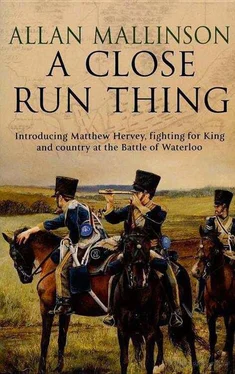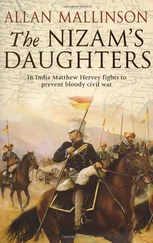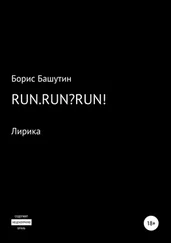Allan Mallinson - A Close Run Thing
Здесь есть возможность читать онлайн «Allan Mallinson - A Close Run Thing» весь текст электронной книги совершенно бесплатно (целиком полную версию без сокращений). В некоторых случаях можно слушать аудио, скачать через торрент в формате fb2 и присутствует краткое содержание. Год выпуска: 1998, ISBN: 1998, Издательство: BANTAM PRESS, Жанр: Исторические приключения, на английском языке. Описание произведения, (предисловие) а так же отзывы посетителей доступны на портале библиотеки ЛибКат.
- Название:A Close Run Thing
- Автор:
- Издательство:BANTAM PRESS
- Жанр:
- Год:1998
- ISBN:9780553507133
- Рейтинг книги:3 / 5. Голосов: 1
-
Избранное:Добавить в избранное
- Отзывы:
-
Ваша оценка:
- 60
- 1
- 2
- 3
- 4
- 5
A Close Run Thing: краткое содержание, описание и аннотация
Предлагаем к чтению аннотацию, описание, краткое содержание или предисловие (зависит от того, что написал сам автор книги «A Close Run Thing»). Если вы не нашли необходимую информацию о книге — напишите в комментариях, мы постараемся отыскать её.
A Close Run Thing — читать онлайн бесплатно полную книгу (весь текст) целиком
Ниже представлен текст книги, разбитый по страницам. Система сохранения места последней прочитанной страницы, позволяет с удобством читать онлайн бесплатно книгу «A Close Run Thing», без необходимости каждый раз заново искать на чём Вы остановились. Поставьте закладку, и сможете в любой момент перейти на страницу, на которой закончили чтение.
Интервал:
Закладка:
‘Good mornin, Mr ’Ervey sir. I ’eard thee moving and thought tha could be doing with some breakfast.’
Hervey shook his head in mock despair. He was Private Johnson’s third officer in a year, though they had now been together for ten months. The others had complained of excessive cheeriness and an impenetrable Sheffield dialect, but Hervey found his ingenuity as a groom more than made up for these alleged shortcomings. Comprehension, he had told them, was ultimately a matter of determination: could they not recognize a black diamond?
Johnson brought in a canteen of tea, some boiled fowl and a loaf of grey bread. ‘An’ there’s some brandy ’ere an’ all, sir,’ — holding up a silver cup which looked to have been intended originally for a less secular purpose.
‘Private Johnson, it is as ever a pleasure to see you of a morning, but unusual in its being so late,’ he replied with a bemused smile.
‘Tha means why didn’t I wake thee afore?’
‘Just so, Johnson.’
‘Well, Johnny Crapaud’s quit t’town, and Cap’n Lankester said tha were on t’sick list. And when tha was awake t’surgeon said that tha were t’ave thee bandages changed.’
Though Hervey had counted on his not being abandoned, he knew it was the greatest good fortune to have received his wound not a day earlier, if the notion of fortune and a wound were in any way appropriate. Had the regiment moved on after the battle, he would have been left in some makeshift hospital on a pile of filthy straw, struck off strength and already becoming but a memory: the needs of the fit and the necessities of the campaign did not often admit of retrospection. But to remain on strength, local-sick, to be tended by the regimental surgeon who would be answerable to Edmonds, was a different prospect; for, however much Edmonds might curse the surgeon as a cast-off from a parish poorhouse, he would perforce be more diligent than many to be found in a so-called army hospital.
Not that this nunnery was anything like as comfortable as some they had seen in Spain, where they resembled more the houses of grandees than of religious orders. The Convent of St Mary of Magdala had a peculiar austerity, a chill which did not come from the weather, for it was seasonally warm and dry outside. Hervey’s sick-quarters were no cell in the purely figurative sense, for they had every appearance of the clink’s lodgings. The walls were white and in poor repair. A crucifix above his bed was their one adornment. The bed was the only piece of furniture except for a prie-dieu with three books. As Johnson arranged the breakfast in a niche of the thick wall, Hervey picked up each book in turn. The Latin bible, strangely perhaps for a son of the cloth, was the first he had ever opened, and he felt a mild revulsion at seeing the scriptures rendered thus — the Englishman’s revulsion at the martyrdom of Tyndale and others for the vernacular. The second volume was in Spanish, El Via de Perfectión, and he puzzled for a time whether this was ‘The Way to’ or ‘The Way of Perfection’, for his Spanish was still rough. But he understood enough to learn that it was the testimony of St Teresa, the mystic from Avila about whom he knew little, and that only because his father had once made a study of the works of St John of the Cross. If he had felt uneasy at the Vulgate, however, the third volume might have thoroughly revolted him, for in the common consciousness of Hervey and his kind the very word Jesuit proclaimed every perfidy imaginable, and this volume was the work of St Ignatius of Loyola, no less.
But the title intrigued rather than repelled him — Exercitia Spiritualia Sancti. The coupling seemed somehow discrepant: he had studied books on exercises for light cavalry, manuals on sword exercises and pistol exercises, signalling exercises even, but spiritual exercises — an altogether arresting notion. He sat down and began to leaf through its pages while at the same time struggling to wrest the stringy meat of the fowl’s leg from its bone.
Meanwhile, Private Johnson had slipped from the cell without his noticing. By the time he reappeared only bones remained of the fowl, and Hervey was wholly engrossed in The Spiritual Exercises. Johnson was grinning broadly but unseen, for Hervey did not immediately lift his head.
‘Mr Evans says this sister will change thee bandages now, sir!’ announced his groom at length.
In his struggle with the complex Latin constructions of St Ignatius’ epilogue, Hervey did not catch this communication from the surgeon. Nor did Johnson wait for any acknowledgement: he was out of the door with the speed of one of the ferrets which travelled in his valise and supplemented the rations with rabbits. He had no intention of being the butt of Hervey’s protests when he tumbled to.
Hervey looked up absently and was all but transfixed by the image of other-worldliness. A white-habited nun, head bowed, holding strips of cloth and a bowl of steaming water, stood framed in the arched doorway like a phantom, albeit of a distinctly celestial kind. As she stepped into the cell, and light from the window fell on her, he saw that her overmantle was more blood-stained than white, though the habit beneath was brown like those of the nuns in Spain. Her face, what little of it was revealed by the wimple, was also smeared with blood and looked excessively drawn, though it was not old. In other circumstances it might have been described as prettyish, but a haunted look made any such worldly adjective inappropriate. It was certainly unlike those of the Spanish sisters, some of whose more sensual features had been decidedly tempting.
Suddenly he recollected himself and sprang up, though pain stabbed his thigh as he did so, adding to his discomposure.
‘I am sorry, Sister, but I was not expecting—’ he began in French. ‘I really think it better if the surgeon attends to this.’
‘Sir, the surgeon has been working throughout the night,’ she replied, in the measured voice of the Languedoc, by contrast with Hervey’s more guttural Alsace, and with evident distaste. ‘There are many soldiers — private soldiers — French and English, yet to be attended.’
Her tone stung him. In his confusion he had conveyed something wholly other than what he had meant. ‘I am sorry; I did not mean to …’ he stuttered; and then, sensing that any explanation would be pointless, he tried to dismiss her: ‘The dressing is perfectly well, Sister. In the circumstances I think you should return to the wounded.’
‘I think we must both do as we are bidden, sir,’ she replied firmly, putting the bowl on the floor and beginning to tear a piece of cloth into bandages with considerable violence.
Hervey could not have been more dismayed. Though the idea of being ministered to by a nun was by no means alien, since he had seen them, and women of rank, in hospitals in the Peninsula, this nun made him uneasy. To begin with, there was her spectral appearance. And, though the Marquess of Wellington may have issued instructions that the army was to enter France not as conquerors but as liberators, it seemed prudent first to be certain that this was how the French themselves regarded them. How he was to dispense with her ministration, however, was entirely beyond him; and at length, after it became apparent that no amount of protest would weaken her resolve, and with more chagrin than he could lately remember, he gave up, sat down and removed his blood-stained overalls. He need not have been concerned, for pain soon proved a great distractor: he suspected that this sister might be more devout than most, but she could scarcely have been less tender, cutting the dressing off briskly, and none too gently wiping away the caked blood.
Читать дальшеИнтервал:
Закладка:
Похожие книги на «A Close Run Thing»
Представляем Вашему вниманию похожие книги на «A Close Run Thing» списком для выбора. Мы отобрали схожую по названию и смыслу литературу в надежде предоставить читателям больше вариантов отыскать новые, интересные, ещё непрочитанные произведения.
Обсуждение, отзывы о книге «A Close Run Thing» и просто собственные мнения читателей. Оставьте ваши комментарии, напишите, что Вы думаете о произведении, его смысле или главных героях. Укажите что конкретно понравилось, а что нет, и почему Вы так считаете.









